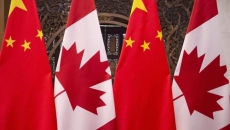OTTAWA - Members of the public service's largest union, which represents more than 120,000 federal workers, have voted in favour of a strike mandate.
🚨Strike Alert🚨
— PSAC-AFPC (@psac_afpc) April 12, 2023
We have received strike mandate from members in the Treasury Board bargaining units which collectively represent more than 120,000 federal government workers.
We will continue to negotiate and will use all the tools available to us, including a strike. pic.twitter.com/KtQbDshtrp
The Public Service Alliance of Canada can now launch a strike anytime in the next 60 days — with national president Chris Aylward saying workers were prepared to strike as soon as Wednesday.
Aylward said at a press conference Wednesday morning that bargaining for fair wages is top of mind, and members are prepared to strike for as long as it takes.
"The majority of our members are women making between $40,000 to $65,000 a year — not the kind of salaries that could withstand being rolled back," he said.
"Our members' wages have been stuck in neutral while the cost of living continues to soar."
The alliance called a strike vote in January following an impasse in negotiations with the federal government, and members had until Tuesday to cast their votes.
Roughly 35,000 federal public servants within the union are deemed essential workers. If the union decides to strike, it may take a staggered approach such that some workers remain on the job at all times.
Still, some reacted to the news on Wednesday with concern about the provision of government services that are already backlogged, including the processing of immigration and employment insurance applications.
"Our goal is to not go on strike. Our goal is to reach a tentative agreement," said Aylward.
Sharon DeSousa, the union's national executive vice president, said that in addition to wages, ending contract work and implementing more anti-racism training for all federal workers and managers are among the issues on the table.
The contentious issue of remote work has also been on the list, with the union saying that members have proven working remotely is just as productive as in-person work.
"It's time to look to the future by enshrining remote work and the right to disconnect in our collective agreements," said DeSousa.
Still, the union said it will not compromise on its wage demands for movement on the hybrid workplace.
The union and the government began mediated negotiations in early April, and both parties are back at the bargaining table this week.
But Aylward said the talks have not been going well.
The parties have yet to address wages in their most recent talks, and he said that how that conversation goes will affect the strike decision.
Negotiations over a new contract had first begun in June 2021, with the union declaring an impasse in May 2022. Both parties have filed labour complaints since then.
The announcement of the vote result comes after workers at the Canada Revenue Agency voted for their own strike mandate last Friday.






